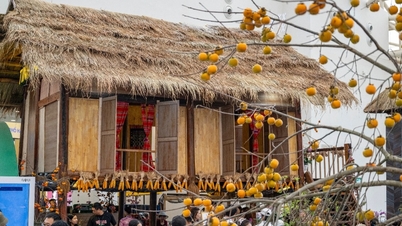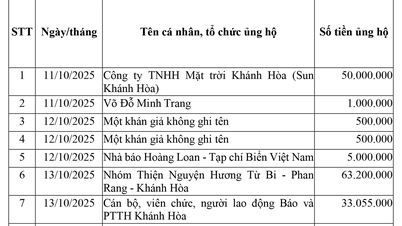Located in the Southeast region, Tay Ninh is known as the "holy land," which is both the center of Cao Dai religion and a convergence of unique cultural, religious and culinary values.
Not only famous for the majestic Ba Den mountain, the immense Dau Tieng lake or the majestic spiritual works, Tay Ninh also conquers tourists with its rustic specialties, rich in local flavor.
Tay Ninh specialties therefore not only enrich the tourist experience but also become the "string" connecting people, culture and the journey to explore this "sacred" land.
From specialty to cultural bridge
Tay Ninh has a nearly 369km long border with Cambodia, located between the Southeast and Southwest regions, creating a unique cultural exchange in cuisine.
With abundant natural ingredients, local people have created many simple yet attractive specialties such as chili salt, rice paper, rice noodles, fermented bean curd, honey, Ba Den custard apple...
Each dish has its own flavor, reflecting the diligence, creativity and love of the homeland of the people.
When it comes to Tay Ninh specialties, the image of Trang Bang dew-dried rice paper is always the pride of the local people. The craft of making dew-dried rice paper has been recognized as a national intangible cultural heritage by the Ministry of Culture, Sports and Tourism since 2015.
Each cake is handmade and exposed to dew in the early morning to maintain its softness, elasticity and distinctive aroma. When rolled with boiled meat, wild vegetables and dipped in sweet and sour fish sauce, the flavor becomes complete, delicate and unforgettable.
Ms. Nguyen Thi Minh Ngoc, a tourist from Hanoi, shared: "I have heard a lot about Trang Bang sun-dried rice paper, but only when I came to see the locals making the rice paper and personally rolled it with wild vegetables did I fully appreciate the deliciousness of this dish. This is a very memorable experience."
According to Ms. Ngoc, it is the rustic specialties that help tourists understand more about the local people and culture, because each flavor is closely linked to the working life of the people.
"When I visited and tried making it myself, I felt their ingenuity and love for the job. It's not just delicious food, but also a story about the homeland told through each slice of rice paper and each grain of shrimp salt," she emphasized.
Besides, Tay Ninh shrimp salt is also an indispensable specialty in the journey to discover local cuisine.
The chili salt making profession in Tay Ninh was recognized as a National Intangible Cultural Heritage in 2023, affirming the unique cultural and culinary values of this land.
The small grains of salt blend salty, spicy, sweet flavors with the scent of dried shrimp, lemongrass, garlic, and chili, making anyone who has tasted it remember it forever. Shrimp salt is not only a side dish with fruit, but also an "ambassador" to spread the flavor of Tay Ninh throughout the country and to the world.
Tourist Pham Quoc Hung, living in Ho Chi Minh City, shared: "I am especially impressed with Tay Ninh shrimp salt, because it has a culinary difference. Specialties such as shrimp salt or rice paper are the bridge between cuisine and culture, helping tourists not only 'eat' but also 'understand' the land they visit."
Another specialty that clearly reflects the culture of the border region is Tay Ninh sour fish sauce made from anchovies, snakehead fish or small shrimp, fermented with rice powder, chili and garlic. The sauce has a rich, spicy and salty taste, similar to the generous and affectionate character of Tay Ninh people.
Along with that, Ba Den custard apple, a fruit grown at the foot of Ba Den mountain, is also becoming a tourist highlight. Visitors can enjoy it on the spot, visit the garden and experience fruit picking, immersing themselves in the local agricultural life.
Connecting tourism and production
Nowadays, the traditional craft of making rice paper and chili salt is not only preserved through many generations but also becomes an attractive destination for tourists.
Many tours have included visiting craft villages in their itineraries, allowing visitors to witness the process of making rice paper or roasting shrimp salt, from selecting ingredients to packaging. These experiences are both interesting and help visitors gain a deeper understanding of the cultural values and labor of local people.
Along with that, many businesses have boldly innovated to elevate their hometown specialties, turning rice paper and chili salt into national brand products.

At the same time, to bring agricultural products, especially Tay Ninh specialties to tourists and consumers, the province has had many support policies implemented synchronously.
According to the Department of Agriculture and Environment of Tay Ninh province, to date, the whole province has been granted 415 growing area codes (16,731 hectares) and 179 packaging facility codes for export to Japan, Korea, the US, Australia, New Zealand and the EU.
More than 130 agricultural processing facilities meet advanced quality management standards such as HACCP, ISO 22000, HALAL, BRC... contributing to increasing added value and competitiveness of products.
Meanwhile, the "One Commune One Product" (OCOP) program has also made a strong impression. To date, the province has 392 OCOP products; including 1 5-star product, 73 4-star products and 318 3-star products, along with 11 commercial display points, contributing to promoting Vietnamese goods and boosting domestic consumption.
At the same time, Tay Ninh's agricultural sector also applies digital technology in product management and consumption, and has supported 3.24 million QR codes for traceability for 42 businesses and cooperatives. Transparency of origin helps consumers feel secure and affirms the reputation of Tay Ninh agricultural products.
According to Deputy Director of the Department of Agriculture and Environment of Tay Ninh province, Truong Tan Dat, the recent implementation of the policy of linking production and consumption of agricultural products has helped farmers' products to be stably consumed, avoiding price pressure, expanding production scale and gradually forming a closed value chain from production to consumption. Thereby, many effective models have been formed, such as linking production and consumption of high-quality rice according to VietGAP, or growing melons using high-tech agriculture.
These models not only increase the value of agricultural products, but also open up a new, sustainable development direction, which is agricultural experience tourism, connecting culture, cuisine and production. From there, every citizen and every business in Tay Ninh can contribute to preserving the traditional spirit in a modern breath, turning rustic dishes such as rice paper and chili salt into not only specialties, but also a cultural bridge and pride for Tay Ninh./.
Source: https://www.vietnamplus.vn/dac-san-tay-ninh-cau-noi-du-lich-va-van-hoa-vung-dat-thanh-post1073190.vnp


![[Photo] Draft documents of the 14th Party Congress reach people at the Commune Cultural Post Offices](https://vphoto.vietnam.vn/thumb/1200x675/vietnam/resource/IMAGE/2025/10/28/1761642182616_du-thao-tai-tinh-hung-yen-4070-5235-jpg.webp)
![[Photo] Flooding on the right side of the gate, entrance to Hue Citadel](https://vphoto.vietnam.vn/thumb/1200x675/vietnam/resource/IMAGE/2025/10/28/1761660788143_ndo_br_gen-h-z7165069467254-74c71c36d0cb396744b678cec80552f0-2-jpg.webp)
![[Photo] National Assembly Chairman Tran Thanh Man received a delegation of the Social Democratic Party of Germany](https://vphoto.vietnam.vn/thumb/1200x675/vietnam/resource/IMAGE/2025/10/28/1761652150406_ndo_br_cover-3345-jpg.webp)





























![[Photo] President Luong Cuong attends the 80th Anniversary of the Traditional Day of the Armed Forces of Military Region 3](https://vphoto.vietnam.vn/thumb/1200x675/vietnam/resource/IMAGE/2025/10/28/1761635584312_ndo_br_1-jpg.webp)













































































Comment (0)